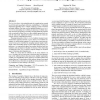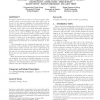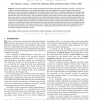112 search results - page 8 / 23 » The essence of compiling with traces |
IWMM
2009
Springer
14 years 2 months ago
2009
Springer
Tracing algorithms visit reachable nodes in a graph and are central to activities such as garbage collection, marshalling etc. Traditional sequential algorithms use a worklist, re...
OOPSLA
2005
Springer
14 years 1 months ago
2005
Springer
An aspect observes the execution of a base program; when certain actions occur, the aspect runs some extra code of its own. In the AspectJ language, the observations that an aspec...
ICS
1999
Tsinghua U.
13 years 12 months ago
1999
Tsinghua U.
—This paper explores the use of compiler optimizations which optimize the layout of instructions in memory. The target is to enable the code to make better use of the underlying ...
LFP
1992
13 years 8 months ago
1992
The CPS transformation dates back to the early 1970's, where it arose as a technique to represent the control flow of programs in -calculus based programming languages as -te...
PLDI
2009
ACM
14 years 2 months ago
2009
ACM
Dynamic languages such as JavaScript are more difficult to compile than statically typed ones. Since no concrete type information is available, traditional compilers need to emit...



